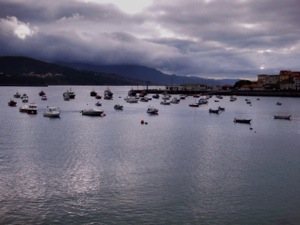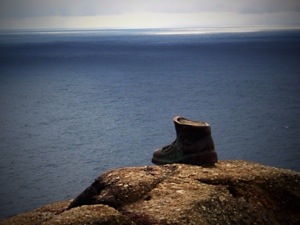Camino 17 (Sunday 10 November): Finisterra
I felt very odd, knowing that I was counting out the last footsteps of an experience that, even were I to repeat it, would be completely different next time. Knowledge changes things, and however well prepared I was for this trip, I had the sense to know that every day was a song to be played by ear. As I grew into the journey, so much became routine that the unexpected became the norm. These last kilometres to the coast were like an oasis of neutrality, as I let my feet walk and my mind grapple with all the meetings, conversations, encounters, sights, thoughts and prayers of these last three weeks.
To reach the coast was to change mental gears entirely. The Atlantic has a different beauty to the Pacific, and even though I saw superficial resemblance to the area around Port Stephens, the reality was a sense of coiled threat, a moving thing that had been wrestling with the land and with the fishermen who inhabited it for thousands of years.

I didn’t rush along the coast, but my feet led me inevitably along the beach, littered and, for me, ruined with the plastic detritus of the weeks bad weather and human carelessness. It was not until I came closed to Finisterra town, clustered under Cape, that I began to appreciate that, love it or hate it, this was the end of the journey and good and bad were part of the lesson.
Unlike the beaches, the harbour was a-bustle with activity and, as I climbed the last kilometres to the lighthouse after dumping my bag in one of the many albergues, I could see the little boats working in the shelter of the bay or setting out into the ocean, tiny dots against the immensity of the sea. It put pilgrimage into perspective, for I was engaged in recreation, while for those setting nets and pots, letting down hooks or diving to the bottom, it was a wrestle between life and death. Maybe the pilgrim’s lot was like theirs once, but all the dud bunks, cold showers and sore feet were as nothing to this elemental struggle.

And so to the lighthouse, past what I thought was the last signpost of the journey, but the Camino was not done with me yet, because as I created the climb and walked into the lighthouse car park, there was a cry of “My God, it’s Chris”, and Bianca and Maria were there, having bussed down from Santiago. It was only the briefest of meetings, because they had been convinced that they now needed to walk to Faro rather than the ‘easy way’, but it reinforced the lesson that the Camino is not the road, the signs and the yellow arrows, but the people along the way.

So there it was, the end of the world for the Celts, both as pagan and Christian, and amidst the vain efforts to emulate the old pilgrims and burn an article of clothing — vain because most of us wear nothing natural these days and it would be ritual melting — were signs of memorials to the journey and, in contrast to the tourists who seemed completely out of place, pilgrims sitting or standing in mute contemplation of the end of all things.

The brass boot was a nice touch, the thing by which all pilgrims live or, if not die, certainly suffer pangs. Thillo turned up, another Camino sign, and we ended up having dinner together and conversing in a mixture of German and English.
And so there it is. Perhaps you will think this a complete anti-climax, because I can give you no revelation from the end of the world. On the other side is America, maybe a vast idea for Western Civilisation but as nothing compared to the awe that the endlessly moving ocean must have instilled in our ancestors. But I am not unchanged, because Finisterra is the same experience as the Pilgrim’s Mass in the Cathedral: an encounter with something so nearly beyond words as to challenge prose and force use back to poetry, to song, to art.
For the record, I walked 459 kilometres. I am not game to add up the hours I spent on the road, and to my shame I cannot I recall all the conversations I shared, but the more vivid memories will not be of sore feet, but of moments exchanged with pilgrims on the same road. Buen Camino!

And so, because all of us must end our pilgrimage in the same way one day, there is only one poem for the end of the world.
Crossing the Bar
— Tennyson
Sunset and evening star,
And one clear call for me!
And may there be no moaning of the bar,
When I put out to sea,But such a tide as moving seems asleep,
Too full for sound and foam,
When that which drew from out the boundless deep
Turns again home.Twilight and evening bell,
And after that the dark!
And may there be no sadness of farewell,
When I embark;For tho’ from out our bourne of Time and Place
The flood may bear me far,
I hope to see my Pilot face to face
When I have crost the bar.




